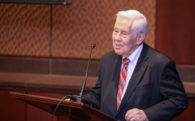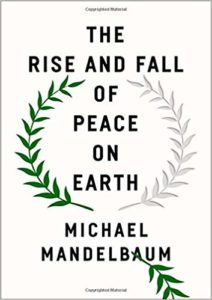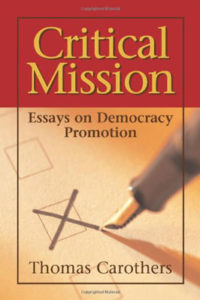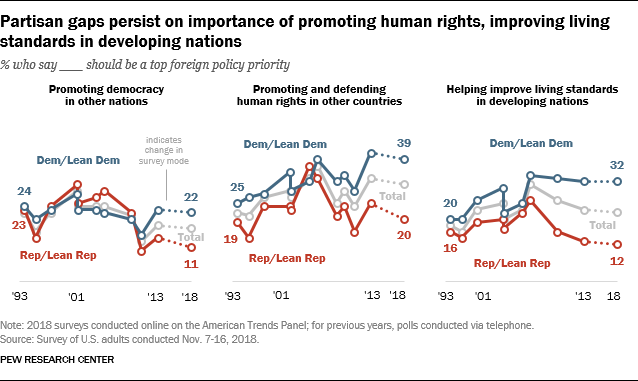
Sen. Richard Lugar
A bipartisan group is releasing a scorecard to grade members of Congress on their foreign policy views. The scorecard — which the group, Foreign Policy for America , describes as the first of its kind — could also come in handy for voters during the 2020 elections, POLITICO reports.
“The conventional wisdom is that American voters vote their pocketbooks, but people also pay attention to foreign policy and the role America is playing in the world and to how actions taken abroad do or don’t affect them at home,” said Michele Flournoy, an adviser to Foreign Policy for America.
 As you read through this guide, or visit scorecard.FP4America.org, you will find valuable information about how each Member of Congress voted and the degree to which they supported principled American engagement in the world, said Andrew Albertson (right), FPA’s Executive Director.
As you read through this guide, or visit scorecard.FP4America.org, you will find valuable information about how each Member of Congress voted and the degree to which they supported principled American engagement in the world, said Andrew Albertson (right), FPA’s Executive Director.
Former U.S. Senator Richard G. Lugar would no doubt have scored highly for both his foreign policy commitments and bipartisanship. The centrist Republican, a soft-spoken foreign policy powerhouse who championed nuclear nonproliferation during 36 years in the U.S. Senate, died on Sunday at age 87, Reuters reports.
It is will great sadness and deep gratitude that the National Endowment for Democracy (NED) mourns the passing of Senator Lugar, who served as a member of NED’s Board of Directors for nine years, from 1992-2001.
“Senator Richard Lugar was one of the great voices in the U.S. Senate and in the country as a whole for democratic internationalism and a bipartisan foreign policy, said NED president Carl Gershman. “In the 1990s he repeatedly led a broad coalition of Republicans and Democrats on the floor of the U.S. Senate in defense of the NED and its mission of advancing and strengthening democracy worldwide.”
“He was also a strong advocate of independent media as a key dimension of a democratic society, and it was at his urging that the NED established the Center for International Media Assistance (CIMA),” he added. “Senator Lugar was beloved and respected by everyone within the NED family, and he will be sorely missed and long remembered.”
Lugar was awarded the NED’s Democracy Service Medal in 2001 for his lifelong contribution to the cause of democracy and human freedom.
In 2013, President Barack Obama presented Lugar, whose ties to him had harmed him in his primary campaign with the Presidential Medal of Freedom, the highest U.S. civilian honor, The Washington Examiner adds. “Dick Lugar’s decency, his commitment to bipartisan problem solving, stand as a model of what public service ought to be,” Obama said.
 It seems safe to say that the political transformations of Russia, China, and Iran into stable democracies would do more to make Europe, East Asia, and the Middle East zones of peace than any other development, argues Michael Mandelbaum, Professor Emeritus of American Foreign Policy at The Johns Hopkins University School of Advanced International Studies, and the author of the new book The Rise and Fall of Peace on Earth.
It seems safe to say that the political transformations of Russia, China, and Iran into stable democracies would do more to make Europe, East Asia, and the Middle East zones of peace than any other development, argues Michael Mandelbaum, Professor Emeritus of American Foreign Policy at The Johns Hopkins University School of Advanced International Studies, and the author of the new book The Rise and Fall of Peace on Earth.
The 25 years after the fall of the Berlin Wall were the most peaceful in history because of three monumental global developments, he writes for The American Interest:
- First, the military dominance of the United States discouraged aggression by other powerful countries.
- Second, the expanding volume of trade, combined with the rapid increase in international investment, also discouraged war. It meant that armed conflict, by interrupting commerce, would impose particularly high costs on the warring countries—even on those that won.
- Third, the spread of democracy—which combines free, fair, and regular elections with the protection of religious, economic, and political liberty—reduced the capacity for war by giving people the means to check their sometimes bellicose rulers at the ballot box and by fostering a political culture of peaceful compromise that, when extended beyond a democracy’s borders, curtail warlike intentions.
 But the bipartisan consensus in American foreign policy over the last 40 years is under increasing strain, argues Ganesh Sitaraman, a professor of law at Vanderbilt, co-founder of the Great Democracy Initiative, and author, most recently, of The Crisis of the Middle Class Constitution.
But the bipartisan consensus in American foreign policy over the last 40 years is under increasing strain, argues Ganesh Sitaraman, a professor of law at Vanderbilt, co-founder of the Great Democracy Initiative, and author, most recently, of The Crisis of the Middle Class Constitution.
Despite important disagreements, both neoconservatives and liberal internationalists supported an aggressive role for America abroad with respect to democracy promotion and economic liberalization. Both the old consensus positions and the new emphasis on the return of great-power politics suffer from not taking political economy seriously enough, he writes for The American Prospect:
Economic power has opposite consequences for democracies in the domestic and foreign-policy realms. Domestically, concentrated economic power threatens democracy, as private individuals or entities can capture government, transforming it into an oligarchy. As a result, democracies must break up or regulate economic power internally. In foreign policy, however, the nation as a whole needs significant economic power to protect democracy from adversaries who would use their economic and political power to oppress the country or undermine democracy. As a result, democracies must gain and project economic power externally. RTWT








